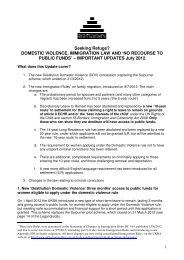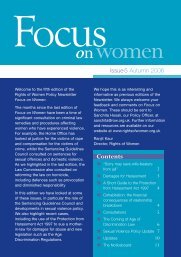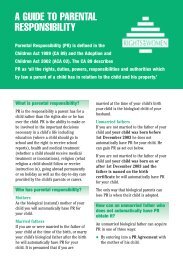Seeking Refuge? - Rights of Women
Seeking Refuge? - Rights of Women
Seeking Refuge? - Rights of Women
You also want an ePaper? Increase the reach of your titles
YUMPU automatically turns print PDFs into web optimized ePapers that Google loves.
Unlike <strong>Refuge</strong>e Leave or Humanitarian Protection, if<br />
you have Discretionary Leave, your case will be<br />
subject to a full review when you apply to extend<br />
your leave or apply for ILR. This means that when<br />
you apply for a further period <strong>of</strong> discretionary leave,<br />
the UK Border Agency will look at all <strong>of</strong> your<br />
circumstances and the circumstances in your<br />
country to see whether you should still be allowed<br />
to remain here.<br />
If you have Discretionary Leave, you have the right<br />
to work and claim housing support and welfare<br />
benefits. Your relatives cannot apply for family<br />
reunion, but they may be able to join you by<br />
making an application under the Immigration<br />
Rules (the rules that determine who may enter or<br />
remain in the UK).<br />
“<br />
Under the Immigration Rules,<br />
people outside <strong>of</strong> the UK can<br />
apply to come to the UK to<br />
work, study or join members <strong>of</strong><br />
their family. However, there are<br />
a number <strong>of</strong> restrictions on<br />
who can come to the UK under<br />
the Immigration Rules and<br />
those who are allowed, have to<br />
show how they could live and<br />
financially support themselves.<br />
You can find out more about<br />
the Immigration rules by<br />
visiting:<br />
www.ind.home<strong>of</strong>fice.gov.uk/po<br />
licyandlaw/immigrationlaw/<br />
”<br />
If you have discretionary leave, you should try to<br />
keep your own national passport valid so that you<br />
can travel if you wish to. However, you can apply<br />
to the UK Border Agency for a certificate <strong>of</strong> travel<br />
in certain circumstances, such as where your own<br />
country has refused you a passport unreasonably,<br />
or you have a good reason to fear your country’s<br />
authorities. For further information, talk to your<br />
legal advisor or visit the UK Border Agency<br />
website at: www.ukba.home<strong>of</strong>fice.gov.uk/ukresid<br />
ency/traveldocuments/<br />
Indefinite Leave to Remain<br />
Indefinite Leave to Remain (ILR), sometimes<br />
referred to as “settlement”, is the right to live in<br />
the UK for an unlimited amount <strong>of</strong> time. If you<br />
have ILR, you have the right to work and claim<br />
housing support and welfare benefits.<br />
You will have to pay an application fee <strong>of</strong> £820<br />
when you apply for ILR. You will also have to<br />
show that you have enough knowledge <strong>of</strong> English<br />
and “life in the UK” in addition to meeting the<br />
legal requirements.<br />
You can show that you meet the English language<br />
and life in the UK requirements by:<br />
• Passing a “Life in the UK Test”. The test is a<br />
computer-based, multiple choice test, based on<br />
the book: 'Life in the United Kingdom: A<br />
Journey to Citizenship’ (2nd edition, 2007),<br />
which costs £9.99 22 . The standard <strong>of</strong> English<br />
required to complete the test is English for<br />
Speakers <strong>of</strong> Other Languages (ESOL) entry level<br />
3. There are currently 90 places across the UK<br />
where you can take the test. The test itself<br />
costs £34 and you can take it more than once,<br />
so if you fail, you can keep taking it until you<br />
pass. For further information about the Life in<br />
the UK requirements, visit<br />
www.lifeintheuktest.gov.uk or contact their<br />
helpline on 0800 0154245.<br />
• Attending a combined ESOL and citizenship<br />
course. These courses are run by further<br />
education colleges or community colleges.<br />
Whether or not you have to pay for them<br />
depends on your financial situation.<br />
The Life in the UK requirements apply to everyone<br />
aged 18-65, unless they can provide medical<br />
evidence that they have a permanent physical or<br />
mental problem that prevents them from taking<br />
the test or studying an ESOL course.<br />
It is important that when you apply for ILR, you<br />
can show that you meet these requirements. If<br />
your leave is coming to an end (but not more than<br />
28 days before it expires, or after it has expired),<br />
and you cannot show that you meet the<br />
requirements, you should apply for an extension<br />
<strong>of</strong> leave and then apply for ILR when you are able<br />
to meet the requirements.<br />
It is possible to lose ILR in certain circumstances,<br />
such as where someone has committed a criminal<br />
<strong>of</strong>fence or has been out <strong>of</strong> the UK for a significant<br />
period <strong>of</strong> time, usually over two years.<br />
22<br />
Copies <strong>of</strong> 'Life in the United Kingdom: A Journey to Citizenship' (2nd edition, 2007) can be bought from bookshops orordered<br />
on line from: http://www.tsoshop.co.uk/bookstore.asp?trackid=001261&FO=1240167<br />
43
















